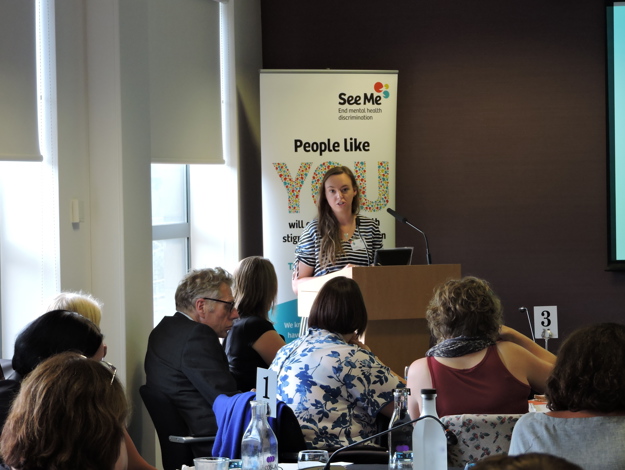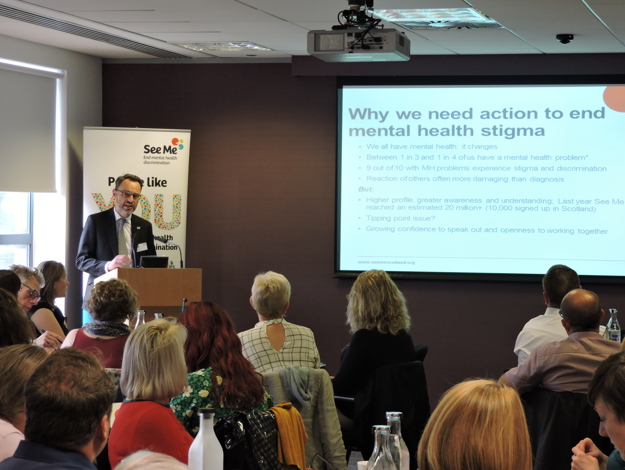Heads of Scottish Health Service Come Together To End Mental Health Stigma and Discrimination
Posted by See Me, 1 September 2017
THE HEADS of the Scottish health and social care services have come together for the first time to look at how to tackle mental health stigma and discrimination in the sector.
See Me, Professor Fiona McQueen, the chief nursing officer, the deputy chief medical officer, Gregor Smith and Iona Colvin, the chief social work adviser to the Scottish Government joined 40 representatives from across health and social care in Edinburgh yesterday to discuss how to treat mental and physical health together.
See Me say that mental health is not treated equally to physical health, which can lead to people experiencing stigma and discrimination, or having mental health needs neglected when experiencing problems with their physical health.
To change this, representatives at the event discussed how to ensure health and social care professionals are equipped to look after the whole person and treat physical and mental health together, providing the parity the Scottish Government aims to achieve in the new Mental Health Strategy.

Gemma Welsh
Gemma Welsh, 26, has struggled with her mental health since she was a teenager, but has received mixed support from the health services. Speaking before the event, she said: “When I was at university I went to the doctor. In the lead up to that I had felt awful and was at my lowest, I was feeling suicidal and had isolated myself from everyone.
“It took a long time for me to convince myself that I needed or deserved help.
“The GP spent five minutes listening to me and my concerns, describing that I was suffering from depression and feeling suicidal. After this she sat back and said, ‘you’ve got clean hair, you’re wearing clean clothes, I really don’t think you are depressed.’
“To get that response sent my mental health tumbling down. Because I had been suicidal and I had experienced feelings like this since my early teens I thought perhaps this was just me and this would be how I always felt.
“For the GP to say I couldn’t have depression almost reinforced that feeling, it made me feel like a failure and useless for feeling the way I did. When you’re suicidal you feel nothing will change or get better. To have a doctor confirm that makes it worse.”
On a separate occasion Gemma was left struggling after paramedics told her they would call the police unless she went with them to hospital.
She said: “I had a big panic attack after a night out. I was in a really bad way and couldn’t calm down. My fiancée called NHS 24 and then an ambulance.
“When the ambulance got here I had calmed down a bit and said to them I didn’t want to go to hospital and didn’t think I needed to. Their reaction was to say that if I didn’t go with them to the hospital then they would call the police.
“I was really threatened and I panicked more. I wasn’t thinking rationally as I was coming out of the panic attack. I thought if they called the police I would be detained or sectioned. There was such a lack of compassion.”
Since then Gemma has found a good GP who has supported her and made sure that she has regular check-ups when she needs them. She added: “Now I have seen how good it can be if you’re treated with compassion.”

Calum Irving
Calum Irving, See Me director said: “If you have poor physical health it can impact your mental health, and if you experience a mental health problem it can impact on your physical health.
“Both are important to each other, but they are not treated the same. If someone went to a doctor and said they were experiencing depression, but had an obvious physical issue this would not be ignored. However if someone is struggling with a long term physical condition, their mental health can frequently be overlooked.
“The result of this is people don’t feel they can open up about their mental health.
“We also know that for health and social care professionals it can be difficult to open up about their own mental health in what are often very stressful jobs. An environment in which there is stigma isn’t good for patients, service users or staff and we want to see this change. “
Professor Fiona McQueen said: “Once the fear of being judged is no longer a fear, and people speak of their mental health issue as freely as their broken leg, we will have succeeded in moving to end the discrimination against people who experience mental health problems.
“See Me has been critical to raising issues and supporting the creation of a society where everybody’s health - mental and physical is equal. Working in partnership across our health and social care system will take us another step forwards.”
Dr Gregor Smith said: “Tackling the stigma and discrimination associated with mental illness is fundamental to helping us realise the philosophy of Realistic Medicine in Scotland, supporting empowerment and recovery orientated approaches to care and intervention using the skills and knowledge across the multi-professional team in innovative approaches to care.”
